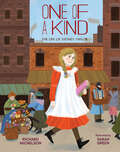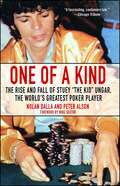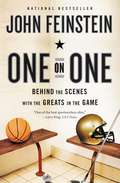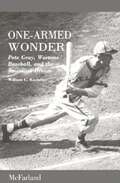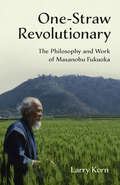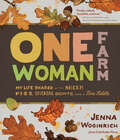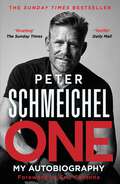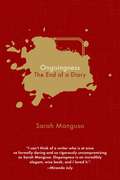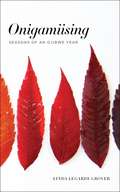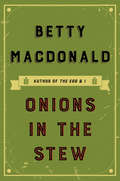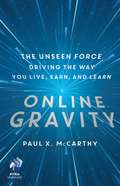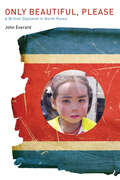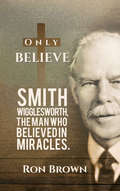- Table View
- List View
One of a Kind: The Life of Sydney Taylor
by Richard MichelsonFor fans of All-of-a-Kind Family, here is the true story of how Sarah Brenner, a poor girl from New York City&’s Lower East Side, became Sydney Taylor: dancer, actress, and successful children&’s book author.Sarah Brenner might have come from an all-of-a-kind family (five sisters who all dressed alike), but she was always one of a kind. Growing up in a Jewish immigrant family on New York&’s impoverished Lower East Side, Sarah loved visiting the library, celebrating holidays with her family, and taking free dance classes at the Henry Street Settlement. But she was always aware of things that weren&’t fair—whether it was that women couldn&’t vote, or how girls were treated in her school, or that her parents had had to leave Europe because they were Jewish. When she grew up, Sarah changed her name to Sydney and became an actress and a dancer, but she never forgot the importance of fighting unfairness, whether it was anti-Semitism at her job or the low wages of workers. And when her daughter complained that it wasn&’t fair that there were no books about Jewish children like her, Sydney put pen to paper and wrote a one-of-a-kind children&’s book.From well-known Jewish children&’s author Richard Michelson, this is the story of how Sarah became Sydney and how she showed children the joy of seeing their culture reflected on the page.
One of a Kind: The Rise and Fall of Stuey ',The Kid', Ungar, The World's Greatest Poker Player
by Nolan Dalla Peter Alson Mike SextonStuey Ungar, the son of a Lower East Side bookie, grew up in a New York of the 1950s and '60s that was straight out of Damon Runyon. By his early teens, he had dropped out of high school and was spending most of his time in the city's under- ground card rooms. So prodigious was his talent for playing gin rummy that he soon found himself bankrolled by members of the Genovese crime family. After thrashing every top gin player on the East Coast, he was forced to broaden his horizons--traveling around the country to find opponents and also learning other card games, including poker. At twenty-one, he moved to Las Vegas for good and quickly found mentors in poker legends such as Jack "Treetop" Straus, "Amarillo Slim" Preston, Doyle Brunson, and Chip Reese, who embraced the skinny five-foot-five kid with the Rimbaud aura. Soon enough, Ungar was playing in the biggest games at the famous Dunes poker room, learning the finer points of the game at incredible speed. In 1980, competing in his second tournament ever and playing a game--no-limit Texas Hold'em--he'd just learned, he shocked the poker universe by winning the World Series of Poker. He would go on to win the event a record three times. In One of a Kind, authors Nolan Dalla and Peter Alson tell the startling tale of a man who managed to win millions of dollars and live the highest of high-roller lives without ever quite understanding or respecting the value of money. Whether tossing away his winnings at the racetrack or on a single roll of the dice, Ungar was notorious for gambling every single dollar in his pocket on a daily basis. The risk that he embodied in his gambling carried over to his personal life. He had no concept of night or day. He didn't own a wristwatch, didn't have a bank account, and for years had no home address or personal possessions. For all his gambling successes, at the end of his life he bounced between hotel rooms, casinos, and crack houses, dependent upon the kindness of friends and strangers. This intimate, authorized biography illuminates the dark genius of poker's most charismatic and mysterious star, who could ruthlessly peer into and read other men's souls but seemed baffled and powerless when confronted with his own.
One of the Family: Why A Dog Called Maxwell Changed My Life - The Sunday Times bestseller
by Nicky CampbellTHE SUNDAY TIMES BESTSELLER'A remarkable autobiography'Andrew Billen, The Times'You're struck by his raw honesty in tackling big issues head-on'Tom Bryant, Daily Mirror'So full of heart' Davina McCall'I was riveted by it in a heartbreaking way . . . you will be gripped' Ranvir Singh, Lorraine'So moving . . . it's a beautiful book'Zoe Ball'Commendable honesty . . . a poignant book about the search for belonging'Daily Express'Remarkable . . . contains a lesson for all of us and delivers a resounding message of hope and of love'James O'Brien*************The brave and moving memoir by Long Lost Family presenter and Radio 5 breakfast show host Nicky Campbell reveals how the simple unconditional love of Maxwell, his Labrador, turned his life around and helped him come to terms with his difficult journey as an adopted child.Raw, honest and courageous in One of the Family, Nicky opens up about how being adopted has made him always feel like an outsider; the guilt he has carried towards his Mum and Dad for needing to trace his birth mother, and the crushing disappointment he felt when he finally met her. And for the first time, he writes about his emotional breakdown and how he has learned to live with a late diagnosis of bipolar. Through it all his passion for dogs and animals has been a lifeline. It is Maxwell's magic, a lesson from a Labrador in simple unconditional friendship, that has allowed him to see all the good in his life: from the security and safety of his childhood home, the love of his wife and four daughters and above all, to better understand the decisions taken by his birth mother to give him up for adoption.
One of the Family: Why A Dog Called Maxwell Changed My Life - The Sunday Times bestseller
by Nicky CampbellTHE SUNDAY TIMES BESTSELLER'A remarkable autobiography'Andrew Billen, The Times'You're struck by his raw honesty in tackling big issues head-on'Tom Bryant, Daily Mirror'So full of heart' Davina McCall'I was riveted by it in a heartbreaking way . . . you will be gripped' Ranvir Singh, Lorraine'So moving . . . it's a beautiful book'Zoe Ball'Commendable honesty . . . a poignant book about the search for belonging'Daily Express'Remarkable . . . contains a lesson for all of us and delivers a resounding message of hope and of love'James O'Brien*************The brave and moving memoir by Long Lost Family presenter and Radio 5 breakfast show host Nicky Campbell reveals how the simple unconditional love of Maxwell, his Labrador, turned his life around and helped him come to terms with his difficult journey as an adopted child.Raw, honest and courageous in One of the Family, Nicky opens up about how being adopted has made him always feel like an outsider; the guilt he has carried towards his Mum and Dad for needing to trace his birth mother, and the crushing disappointment he felt when he finally met her. And for the first time, he writes about his emotional breakdown and how he has learned to live with a late diagnosis of bipolar. Through it all his passion for dogs and animals has been a lifeline. It is Maxwell's magic, a lesson from a Labrador in simple unconditional friendship, that has allowed him to see all the good in his life: from the security and safety of his childhood home, the love of his wife and four daughters and above all, to better understand the decisions taken by his birth mother to give him up for adoption.
One of the Family: Why A Dog Called Maxwell Changed My Life - The Sunday Times bestseller
by Nicky CampbellLong Lost Family presenter and Radio 5 breakfast show host Nicky Campbell reveals how the simple unconditional love of Maxwell, his Labrador, turned his life around and helped him come to terms with his difficult journey as an adopted child.Dogs have been the common link between the key moments in Nicky Campbell's life: there was Toby, the dog he never knew and who sat devotedly by his cot before his adoption, and then the adorable fox terrier Candy, who arrived soon after he was happily adopted. Nothing could replace the loss of Candy when he died suddenly, when Nicky was only eleven.Yet it took the arrival of Maxwell, an affectionate Labrador, for Nicky to uncover the simple truth a dog can reveal. The long journey he's been on to cope with the difficult emotions of his adoption, the discovery of his birth parents, his fears of abandonment and the solace he's taken in animals of all kinds, have led Nicky to truly understand the life-changing lesson a dog can teach us: that when we strip away our follies and foibles, the only thing we ever really need in life is love that is given and received freely and unconditionally - just the way a dog does.(P) 2021 Hodder & Stoughton Ltd
One of the Few: A Story of Personal Challenge through the Battle of Britain and Beyond
by Johnny Kent Alexandra KentNew and updated edition: the original autobiography is enhanced by the addition of family photos and extracts from unpublished letters and writings by the author, and a moving and informative new introduction and epilogue by Alexandra Kent, Johnny Kent’s daughter, who presents the father she knew, not only a distinguished and brave war hero but a man who suffered with the scars of war.‘I turned into the attack … The German formation split up and a general mêlée ensued, grey shapes with black crosses on them flashed past only feet away, next the brown and green of a Hurricane flashed across the sights … so confused was the fight that one had little or no chance to see if one’s fire had taken effect before having to take wild evasive action to avoid either the enemy’s fire or a collision.’Group Captain Johnny Kent joined the RAF in the 1930s and went on to become a flight commander of one of the most successful fighter squadrons of the Second World War. In this role, he helped the famous 303 Polish Squadron play a decisive part in the Battle of Britain, and this earned him the highest Polish military award, the Virtuti Militari, as well as the affectionate nickname ‘Kentowski’.Group Captain Kent’s fascinating memoirs, originally published in 1971, tell the story of his life in the RAF, from his struggles as a boy on the Canadian Prairies to get into the air, detailing his experiences as a test pilot in Farnborough and his constant efforts to excel at what he did. In this new edition, alongside the classic tale of derring-do, Kent’s daughter provides supplementary material that places his extraordinary story into the broader context of his life as a son, husband and father. Poignant questions are raised about what it meant to be ‘One of the Few’ – for both the men themselves and those to whom they were closest.
One of the Lucky Ones
by Lucy Ching<P>Many people might think me unlucky because I am blind, writes Lucy Ching in this poignant autobiography, but I prefer to think of myself as one of the lucky ones. <P>Indeed, Lucy Ching's achievements despite total blindness would be outstanding in any time and place- especially so in China of the 1930s, where the blind were treated as outcasts and blind children were sometimes sold into slavery by their own families. Lucy Ching was fortunate enough to be kept at home with her parents, but as she reveals in this remarkable memoir, her triumph over her disability was due to her own fierce determination... and to a very special friendship. Under the devoted care of her amah, an illiterate servant woman who was guided only by common sense, intuition and affection for the child, Lucy Ching learned to live in a sighted world, vowing to have the independence and fulfillment of a profession. <P>As a child, Lucy taught herself to read and write in braille and was allowed to attend school with sighted children. And, quite against the beliefs of her family, she converted to Christianity and made a solemn promise to God that her lifework would be to help the blind. Lucy's unflagging dedication was rewarded with a scholarship to the Perkins School for the Blind in Boston, where she received the special training which has enabled her to carry out her promise. <P>My life could have been spent in enforced idleness and isolation, observes Lucy Ching, cut off from other people and their lives and problems. But I was luckier than that. God had other plans for me. <P>Like Helen Keller, she found herself, her work and her God through affliction. Today Lucy Ching is a social worker in Hong Kong, where she works with the blind as well as other handicapped people.
One on One: Behind the Scenes with the Greats in the Game
by John FeinsteinAfter numerous beloved and bestselling sports books, John Feinstein returns to the subjects of his first ten books, crafting a narrative of the most revealing encounters he's had. Feinstein has interviewed some of the most enduring figures in sports--from hallowed coaches such as Bob Knight, Jim Valvano, Mike Krzyzewski, and Dean Smith to beloved athletes including Jack Nicklaus, Tiger Woods, Arnold Palmer, and John McEnroe, and here we have John Feinstein at his very best. He goes behind the scenes of his reporting from The Final Four, Wimbledon, The US Open, the Army/Navy game, the Olympics, and more, opening up sport's most private, closed-door places and sharing exclusive stories from the reporting of books like Season on the Brink, A Good Walk Spoiled, A Season Inside, and A Civil War.These are the coaches and athletes who know their games the best, and the legends and legendary moments that gave inherent shape to our favorite pastimes.
One, Two, Three... The Story of Matt, a Feral Child
by Eleanor CraigFrom the book: The voice on the phone was pleading, a husky whisper: "Please come. We fight about Matt all the time. Someone's got to help my son." Author Eleanor Craig, a social worker in real life, has written a hauntingly true story of her work with this boy from the moment she answered his father's desperate call. The first psychiatrist to evaluate the six-year-old boy described him as "a feral child, as wild as if he'd been raised by animals." Brain-damaged, retarded, autistic, schizophrenic--eventually Matt was accorded all the labels. And in an effort to prevent his being sent to a mental institution for the rest of his life, the author began to work with the boy, and with his mother, Nellie. The child ran naked at home, urinated on the living-room floor, and had yet to speak a word or even to indicate that he could understand anyone speaking to him. He drank from a baby's bottle, screamed constantly, had violent tantrums, and physically abused his mother. Yet until Matt's father called the clinic for help, only the child's parents knew of his existence. And then one day, walking down the stairs from the author's office, Matt began to count: -One... two... three...." But what could the future hold for a child who had spent the first six years of his life in a darkened home? And what about his mother, who was so fearful of letting him grow up that she was willing to risk his sanity? Readers will gasp at scenes in this incredible story of a family whose dependency on society was perpetuated by the inadequacies of the system itself. Other books by Eleanor Craig are available from Bookshare.
One-Armed Wonder: Pete Gray, Wartime Baseball, and the American Dream
by William C. KashatusIn the spring of 1945 Pete Gray, who had lost his right arm in a childhood accident, made his debut with the St. Louis Browns of the American League. Dubbed the "One-Armed Wonder" by sportswriters, Gray was a controversial figure from the moment he stepped on a major league diamond. Club owners saw him as a gate attraction for war-weary baseball fans; some of his teammates openly questioned his ability and felt that he cost them a chance to capture a second consecutive pennant. Gray was left to wonder just how good a ballplayer he really was. Though some may have doubted Gray's ability, no one questioned the cantankerous outfielder's desire to reach the major leagues. From the coalfields of northeastern Pennsylvania, Pete Gray fought his way through the minor leagues with single-minded determination. Despite his missing arm, he was the most valuable player of the minor league's Southern Association in 1944. His on-field exploits and relentless fire became an inspiration to the many servicemen who returned from the battlefields of World War II with missing limbs.
One-Straw Revolutionary: The Philosophy and Work of Masanobu Fukuoka
by Larry KornOne-Straw Revolutionary represents the first commentary on the work of the late Japanese farmer and philosopher Masanobu Fukuoka (1913 – 2008), widely considered to be natural farming&’s most influential practitioner.Mr. Fukuoka is perhaps most known for his bestselling book The One-Straw Revolution (1978), a manifesto on the importance of no-till agriculture, which was at the time of publication a radical challenge to the global systems that supply the world&’s food, and still inspires readers today. Larry Korn, who apprenticed with Mr. Fukuoka in Japan at the time, translated the manuscript and brought it to the United States, knowing it would change the conversation about food forever. The One-Straw Revolution, edited by Korn and Wendell Berry, was an immediate international success, and established Mr. Fukuoka as a leading voice in the fight against conventional industrial agriculture. In this new book, through his own personal narrative, Larry Korn distills his experience of more than thirty-five years of study with Mr. Fukuoka, living and working on his farm on Shikoku Island, and traveling with Mr. Fukuoka to the United States on two six-week visits. One-Straw Revolutionary is the first book to look deeply at natural farming and intimately discuss the philosophy and work of Mr. Fukuoka. In addition to giving his personal thoughts about natural farming, Korn broadens the discussion by pointing out natural farming&’s kinship with the ways of indigenous cultures and traditional Japanese farming. At the same time, he clearly distinguishes natural farming from other forms of agriculture, including scientific and organic agriculture and permaculture. Korn also clarifies commonly held misconceptions about natural farming in ways Western readers can readily understand. And he explains how natural farming can be used practically in areas other than agriculture, including personal growth and development.The book follows the author on his travels from one back-to-the-land commune to another in the countryside of 1970s Japan, a journey that eventually led him to Mr. Fukuoka&’s natural farm. Korn&’s description of his time there, as well as traveling with Mr. Fukuoka during his visits to the United States, offers a rare, inside look at Mr. Fukuoka&’s life. Readers will delight in this personal insight into one of the world&’s leading agricultural thinkers.&“A profound sharing of the essential philosophy of natural farming translated through the friendship between Larry Korn and Masanobu Fukuoka. . . [It] offers wise insights into authentic practices that honor the community of all life.&”—Katrina Blair, author of The Wild Wisdom of Weeds
One-Way Ticket: Nine Lives on Two Wheels
by Jonathan VaughtersThe new memoir tracing story of cycling since the 1980s, through the eyes of Jonathan Vaughters, founder of team Education First and one of the sport's most towering figures.Jonathan Vaughters' story is the story of modern cycling. From his early years as a keen cyclist in his hometown in Colorado to his unflinching rite of passage as a professional rider with US Postal to his elevation as one of cycling's most resilient, ethical and intelligent team bosses, the highs and lows of his career have mirrored those of the sport itself. Vaughters has had a front-row seat for most of the major events in cycling over the past three decades. He was both a former teammate of Lance and a leading witness against him. And he went on to renounce doping and start the first pro cycling team to dedicate itself to clean riding, which has grown into one of the most successful teams competing today and started a movement that has swept across the sport.This is also not simply a story of races won and lost: Vaughters shows readers how he navigated the complex, international business of building Slipstream into a world-class cycling team. Over the past decade, he has led the sport out of the scandal-plagued Armstrong era. By presenting the world with a team made of talented racers built around a rigorous approach to clean racing, he set a new standard within cycling that has since spread across the peloton. Written from the unique perspective of both a racer and a team manager, One-Way Ticket gives the complete story of what it takes to build a winning team and repair the reputation of a sport.
One-Woman Farm: My Life Shared with Sheep, Pigs, Chickens, Goats, and a Fine Fiddle
by Jenna WoginrichIn this inspiring memoir, Jenna Woginrich reflects on the joys, sorrows, trials, and blessings discovered through a year of homesteading. With eloquent prose, delightful illustrations, and inspiring snippets of poetry, Woginrich revels in the unique charms of each season on the land. Full of poignant observations and fascinating tidbits of farming lore, this book is a heartfelt testament to the deep fulfillment one can find in the practical tasks and timeless rituals of an agricultural life.
One: My Autobiography
by Peter Schmeichel'Why me? How could a boy from a Copenhagen tower block say I want to be a champion with Manchester United and Denmark and make it happen?'Peter Schmeichel is a giant of football, who won more Premier League titles (five) than any player in his position and captained Manchester United in the incomparable, last-gasp Treble-clinching win over Bayern Munich in the 1999 Champions League final. 'I don't believe a better goalkeeper played the game,' Sir Alex Ferguson said. One: My Autobiography is Schmeichel's story.In it, he takes us inside the remarkable, winning environment of a club that transformed football during the 1990s, and on to the pitch on that crazy, breathless night in Barcelona in 1999. From Ferguson's unique gifts to Eric Cantona's unique personality, he delivers a close-up and insightful portrait of United's golden era.However, One: My Autobiography goes way beyond the pitch.Schmeichel has an incredible family story to tell, starting with his father, Antoni, a brilliant Polish jazz musician who battled demons and for years kept a momentous secret from those around him. And he explores what he has been able to pass on to his own son, Kasper - himself a Premier League-winning goalkeeper and number one in the Danish national side.Peter's life after football, seldom straightforward, is described with astonishing candour. One: My Autobiography is about football, origins, journeys and legacy.
One: My Autobiography
by Peter Schmeichel'Why me? How could a boy from a Copenhagen tower block say I want to be a champion with Manchester United and Denmark and make it happen?'Peter Schmeichel is a giant of football, who won more Premier League titles (five) than any player in his position and captained Manchester United in the incomparable, last-gasp Treble-clinching win over Bayern Munich in the 1999 Champions League final. 'I don't believe a better goalkeeper played the game,' Sir Alex Ferguson said. One: My Autobiography is Schmeichel's story.In it, he takes us inside the remarkable, winning environment of a club that transformed football during the 1990s, and on to the pitch on that crazy, breathless night in Barcelona in 1999. From Ferguson's unique gifts to Eric Cantona's unique personality, he delivers a close-up and insightful portrait of United's golden era.However, One: My Autobiography goes way beyond the pitch.Schmeichel has an incredible family story to tell, starting with his father, Antoni, a brilliant Polish jazz musician who battled demons and for years kept a momentous secret from those around him. And he explores what he has been able to pass on to his own son, Kasper - himself a Premier League-winning goalkeeper and number one in the Danish national side.Peter's life after football, seldom straightforward, is described with astonishing candour. One: My Autobiography is about football, origins, journeys and legacy.
One: The Sunday Times bestseller
by Peter SchmeichelThe autobiography of one of the greatest goalkeepers of all time.'Why me? How could a boy from a Copenhagen tower block say I want to be a champion with Manchester United and Denmark and make it happen?'Peter Schmeichel is a giant of football, who won more Premier League titles (five) than any player in his position and captained Manchester United in the incomparable, last-gasp Treble-clinching win over Bayern Munich in the 1999 Champions League final. 'I don't believe a better goalkeeper played the game,' Sir Alex Ferguson said. One: My Autobiography is Schmeichel's story.In it, he takes us inside the remarkable, winning environment of a club that transformed football during the 1990s, and on to the pitch on that crazy, breathless night in Barcelona in 1999. From Ferguson's unique gifts to Eric Cantona's unique personality, he delivers a close-up and insightful portrait of United's golden era.However, One: My Autobiography goes way beyond the pitch.Schmeichel has an incredible family story to tell, starting with his father, Antoni, a brilliant Polish jazz musician who battled demons and for years kept a momentous secret from those around him. And he explores what he has been able to pass on to his own son, Kasper - himself a Premier League-winning goalkeeper and number one in the Danish national side.Peter's life after football, seldom straightforward, is described with astonishing candour. One: My Autobiography is about football, origins, journeys and legacy.(P)2021 Hodder & Stoughton Limited
Onflow: Dynamics of Consciousness and Experience
by Ralph PredPred supplies an account of the nature of consciousness that grapples with; the raw unverbalized stream of experience. Pred's analysis deals with the elusive and commonly neglected continuities in the stream of consciousness.
Ongoingness: The End of a Diary
by Sarah Manguso“[Manguso] has written the memoir we didn’t realize we needed.” —The New YorkerIn Ongoingness, Sarah Manguso continues to define the contours of the contemporary essay. In it, she confronts a meticulous diary that she has kept for twenty-five years. “I wanted to end each day with a record of everything that had ever happened,” she explains. But this simple statement belies a terror that she might forget something, that she might miss something important. Maintaining that diary, now eight hundred thousand words, had become, until recently, a kind of spiritual practice.Then Manguso became pregnant and had a child, and these two Copernican events generated an amnesia that put her into a different relationship with the need to document herself amid ongoing time.Ongoingness is a spare, meditative work that stands in stark contrast to the volubility of the diary—it is a haunting account of mortality and impermanence, of how we struggle to find clarity in the chaos of time that rushes around and over and through us.“Bold, elegant, and honest . . . Ongoingness reads variously as an addict’s testimony, a confession, a celebration, an elegy.” —The Paris Review“Manguso captures the central challenge of memory, of attentiveness to life . . . A spectacularly and unsummarizably rewarding read.” —Maria Popova, Brain Pickings
Onigamiising: Seasons of an Ojibwe Year
by Linda LeGarde GroverLong before it came to be known as Duluth, the land at the western tip of Lake Superior was known to the Ojibwe as Onigamiising, &“the place of the small portage.&” There the Ojibwe lived in keeping with the seasons, moving among different camps for hunting and fishing, for cultivating and gathering, for harvesting wild rice and maple sugar. In Onigamiising Linda LeGarde Grover accompanies us through this cycle of the seasons, one year in a lifelong journey on the path to Mino Bimaadiziwin, the living of a good life. In fifty short essays, Grover reflects on the spiritual beliefs and everyday practices that carry the Ojibwe through the year and connect them to this northern land of rugged splendor. As the four seasons unfold—from Ziigwan (Spring) through Niibin and Dagwaagin to the silent, snowy promise of Biboon—the award-winning author writes eloquently of the landscape and the weather, work and play, ceremony and tradition and family ways, from the homey moments shared over meals to the celebrations that mark life&’s great events. Now a grandmother, a Nokomis, beginning the fourth season of her life, Grover draws on a wealth of stories and knowledge accumulated over the years to evoke the Ojibwe experience of Onigamiising, past and present, for all time.
Onions in the Stew
by Betty MacDonaldIn Onions in the Stew, Betty MacDonald, author of the beloved classic, The Egg and I, is in unbuttonedly frolicsome form as she describes how, with husband and daughters, she set to work making a life on Vashon Island, a then rough-and-tumble island in Puget Sound, just a ferry-ride from Seattle.
Onions in the Stew
by Betty MacdonaldOnions in the Stew is a true story about an island, a house and a family. The island, Vashon, lies "plump, curvy and green" in the icy waters of Puget Sound, and the house (dream) is the one the MacDonald ,.: a"-. family found there, after long search, '~ _'~ : and has lived in ever since.
Online Gravity: The Unseen Force Driving the Way You Live, Earn, and Learn
by Paul X. MccarthyThe Freakonomics of the digital economy, offering fascinating insights into the new rules that are reshaping the online worlds of business, education, and leisure.Are you concerned that technology and the web are moving too quickly for you to keep up? Are you worried about the future of your career in the face of an increasingly global and competitive workforce? We all worry about change. And the changes being brought about by unseen forces in the global economy are profound. Do you know someone who has lost their job in the last five years working in IT, media, finance, or retail? These industries and many others are already feeling the pinch of online gravity: the invisible forces of the online world that govern its role in the global economy--and its effect on you. Industry expert Paul X. McCarthy reveals how online businesses are fueled by a starkly different set of economic rules than those existing purely offline. He calls these forces "online gravity," which favor the creation of planet-like super-businesses (such as Amazon and Google) from surprising and unpredictable quarters. As more and more traditional industries such as media, music, travel, photography, and even banking are steadily consumed and transformed by giant online enterprises, more and more of the world is feeling online gravity's increasingly powerful pull. For anyone interested in the future of global technology, economics, or business, Online Gravity is an indispensible book that explains how you can harness these forces to improve your career, your health, your wealth--and even the prospects of the next generation.
Only Beautiful, Please: A British Diplomat in North Korea
by John EverardCoverage of the Democratic People's Republic of Korea (DPRK) all too often focuses solely on nuclear proliferation, military parades, and the personality cult around its leaders. As the British ambassador to North Korea, John Everard had the rare experience of living there from 2006, when the DPRK conducted its first nuclear test, to 2008, just before Kim Jong Il's stroke. While stationed in Pyongyang, Everard's travels around the DPRK provided him with numerous opportunities to meet and converse with North Koreans. Only Beautiful, Please goes beyond official North Korea to unveil the human dimension of life in that hermetic nation. Everard recounts his impressions of the country and its people, his interactions with them, and his observations on their way of life. He provides a picture as well of the life of foreigners in this closed society, considers how the DPRK evolved to its current state, and discusses the failure of current approaches to tackle the challenges that it throws up. The book is illustrated with striking and never-before-seen photographs taken by Everard during his stay in North Korea.
Only Believe: Smith Wigglesworth, The Man Who Believed In Miracles.
by Ron BrownSmith Wigglesworth was born in Bradford, Yorkshire, in 1859 into a very poor working-class family. But by the time of his death in 1948, the influence he had on many thousands of people worldwide was simply incredible. Smith Wigglesworth was a simple uneducated man who became a plumber by trade and believed in divine healing. He changed the lives of many sick and terminally ill people through his healing ministry in many different countries around the world. He is also credited to have raised people from the dead through the power of the Holy Spirit. He believed that if you have total trust in God, then all things are possible, including divine healing. During my time of research on this story, I came across so many incredible stories about this man and his healing ministry that if only half of them are true, he still was a truly exceptional man.

